It’s Advent in South Sudan, which means that everybody is busy with endings and beginnings. It is a beautiful time here right now, as the rains ended in October and the land is still green. We have been enjoying a time of relative security for the last few months, which has allowed us to harvest the groundnut crop in peace.
This week in Loreto Secondary School is taken up with the end of term exams, so all of students are diligently going over their class notes, working in study groups, and preparing as best they can. I usually go for a walk around 6:00am, as the sun comes up and before the heat of the day sets in. Already, there are students sitting under trees or in classrooms getting ready. However, this is nothing unusual. It happens right throughout the year. The girls know that education is their best way of ensuring they and their family have a better future. School is serious business.
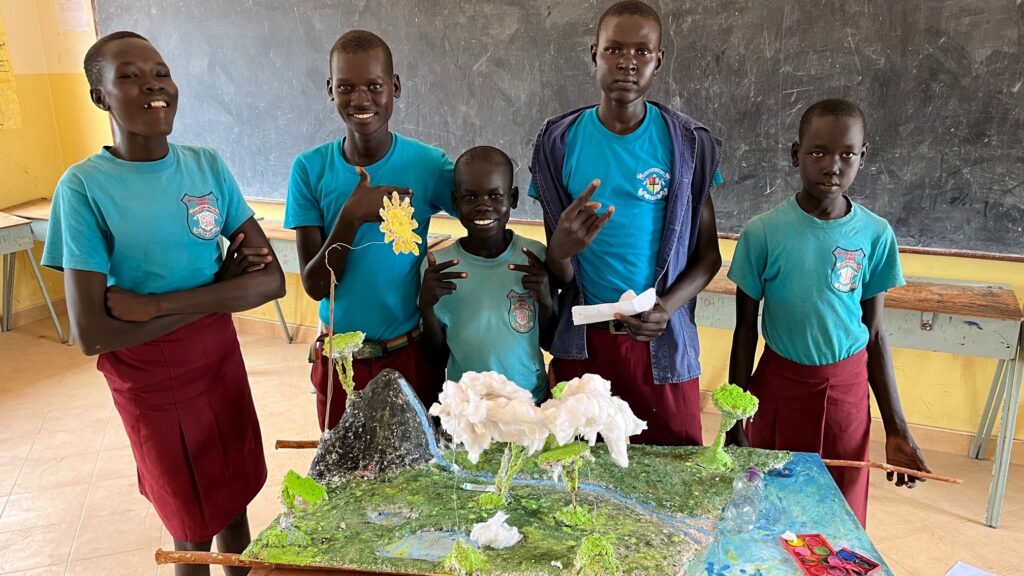
It’s not so serious though that they can’t take time to have fun or get involved in important extracurricular activities. Last Friday, a group participated in a local government project around the rights of women. On Saturday, our Peace Club staged a roadside play in the local village. Before a group of the chiefs, families, and school children, they debuted their new drama on the need for peace in South Sudan. There was also poetry, traditional dance, some speeches, and plenty of laughter. It was the first time that they, as a group of young women, addressed the chiefs about their hopes for the future. The Benydit, or head chief, was delighted with the work and encouraged them to continue.

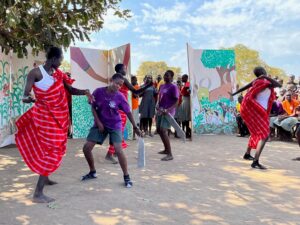
In the Primary School the kids have been busy too. Last week, we had a fancy dress competition, where kids created wonderful papier mâché lions and cows, along with weather conditions, mathematical symbols and shapes, fruits and vegetables, and traditional costumes. On Thursday, the focus was on arts and crafts, again related to their studies. They drew pictures of insects for biology, model villages and farms for citizenship, and the water cycle for general science. Everything was made from scrap paper and reused cardboard. Their creativity was extraordinary.
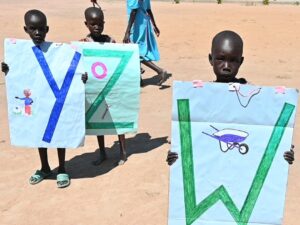
While things are winding down for Christmas in the schools, we are only getting started in the Rumbek Campus of the Catholic University of South Sudan. We have had a new intake of students for our degree programmes in English and English literature and in business administration. Right now, they are taking part in an intensive six-week course in English and maths to improve their basic standard and prepare them to begin their classes at the end of January.
It is an exciting time, because it is hoped that from this group we will have a new generation of well-trained secondary school teachers and business leaders. We are carrying on with our partial scholarship for women to encourage greater participation. We already have quite a few enrolled and a number of these are mothers who are returning to education, something that rarely happens here.
In addition, we are refurbishing our library and student centre. Previously, the building we used was dilapidated and bats were in the process of eating through the ceiling. The entire power supply came from an old solar unit and a couple of second-hand car batteries. The floor was cracked and pockmarked, although potholed might be a better description. As I write, the builders are putting in a new ceiling. Once that is finished, they will plaster the walls properly and we have sourced a durable, but inexpensive, tile for the floor.
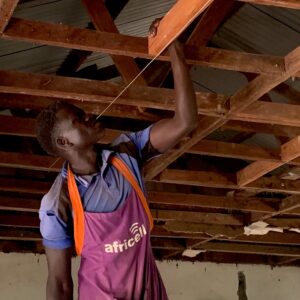
Some may argue whether this is the most urgent need. However, education is the essential foundation of a country that, if done properly, will ensure development that is sustainable for everyone. It is about giving someone a rod, instead of offering them fish year after year. Our students make real sacrifices to be here, whether they are in primary, secondary, or third level, but with their energy, vision, and commitment the future is bright indeed.
Ben Nhialic areer kek a yin,
Fr Alan
Read more from Fr Alan’s missionary journey in South Sudan:
- Looking for a Sign on the Way to South Sudan
- Building a Better Future in South Sudan
- Christmas Greetings from Fr Alan in South Sudan
- A Cup of Sugar and Maybe a Goat
- Mock Exams and Real Life in South Sudan
- As Easy as Baking a Cake
- Holy Week on the Move
- Three Arrivals and a Party
- Celebrating the Missionary Life
- Seeds of Hope
- Young People Fighting COVID-19 in Rumbek
- Ticket to Ride
- Lions, Snakes, and the World’s Deadliest Predator
- Vaccine Status: Denied
- Christmas in South Sudan
- A Bigger Shovel
- A Week in the Life of Loreto – Bishops, graduations, an ambassador, and the Pope
- Sowing Seeds
- A visit from the MSC Superior General
PLEASE HELP US TO TRANSFORM LIVES IN SOUTH SUDAN